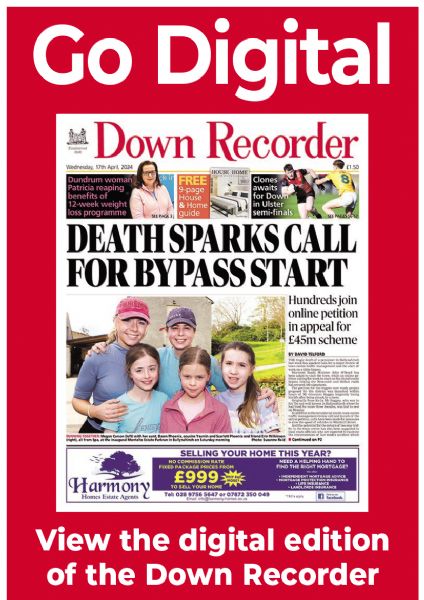Councillors back Brexit deal ‘people's vote’
Councillors back Brexit deal ‘people's vote’
3 October 2018
LOCAL politicians have backed calls for a ‘people’s vote’ on the final Brexit deal that will see the UK leave the European Union.
The decision was taken at Monday night’s monthly meeting of Newry, Mourne and Down Council, but it did not secure the backing of all the main political parties with the UUP and DUP voting against it.
The local authority is to write to Prime Minister Theresa May and Secretary of State Karen Bradley demanding that voters have their say on the final Brexit deal.
Politicians voted by 25 votes to eight to back an Alliance motion calling for the people’s vote and also accepted a Sinn Fein amendment that in the event of a no deal, remaining in the EU must be an option and there must be no diminution of human rights and equality provision which must be protected and no exclusion from the single market or customs union.
Alliance councillor Andrew McMurray insisted the people’s vote is not about overturning the result of the referendum.
He said his party recognises that no one voted for a hard or no deal Brexit and that the council’s “landmark decision” to back his motion is not only for those who voted remain, but those who voted to leave the EU and are now concerned about how the negotiations are going.
“Across the UK, more and more people are asking for a people’s vote, to have the opportunity to pass their final judgement on what will define us for generations to come. Brexit will affect everyone and we should be looking at the detail and allowing everyone the right to have their say,” said Cllr McMurray, insisting his motion was about doing what was best for all in Northern Ireland.
“Through supporting political stability and protecting the Good Friday Agreement, maintaining open borders throughout these islands, and protecting our economy and enabling future opportunities, Northern Ireland only works based on sharing and interdependence, yet Brexit entails new divisions, barriers and friction,” he said.
“Politicians have failed to deliver and it is time for the people to take back control. What we have seen is an abject failure of politicians to lead in the face of this crisis. Instead, they have retreated into the confines of their own ideology rather than search for a consensus within the country. That extends not only from Westminster, but also closer to home.”
SDLP councillor, Gareth Sharvin, said 67.2% of the South Down electorate voted to remain in the EU, with many in business and the financial services sector having major fears about the full impact of Brexit, not least, job losses.
The DUP’s Glyn Hanna said the referendum was the people’s vote with the UK deciding to leave the EU. He said the people have spoken and accused the Irish government of using the ongoing negotiations to separate the six counties away from the UK, branding such a scenario as “totally and utterly wrong.”
He added: “I believe most of the problems during the negotiations are coming from the EU at this moment in time, with the EU almost bullying the UK over the border issue. After we leave Europe, the opportunities will be unbelievable. We did not vote a bad a deal or a no deal, we voted to leave the EU.”
Independent councillor Jarlath Tinnelly suggested Brexit was the “biggest upheaval in Ireland since partition” and that the people “driving us over the cliff have no regard for the unique situation in the North and the strong possibility that all the progress made over the past 20 years could unravel.”
The UUP’s David Taylor said there were “strong and contrasting opinions” on the Brexit issue and he had concerns that the call for the people’s vote was designed to overturn the democratic decision to leave the EU. He said regardless of where people stood on the issue, the result of the vote should be respected and every effort made to get the best possible Brexit deal.
Independent councillor Henry Reilly said people across Europe believed their voices were not being heard and that policies the EU was implementing on immigration and other issues were “alienating ordinary people”, leading to an upsurge in extreme right wing movements.

